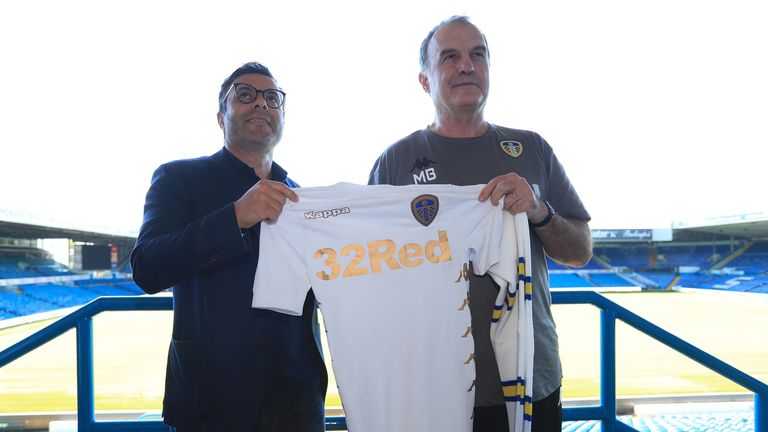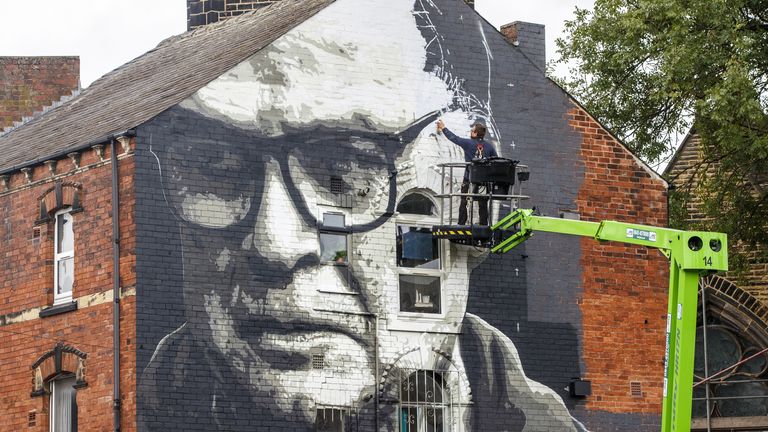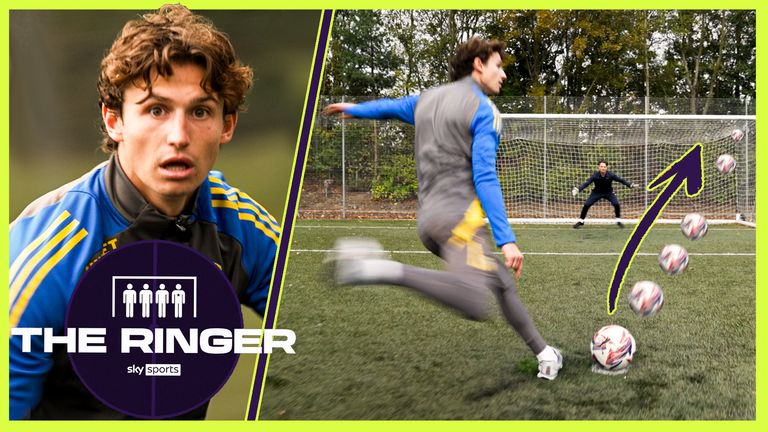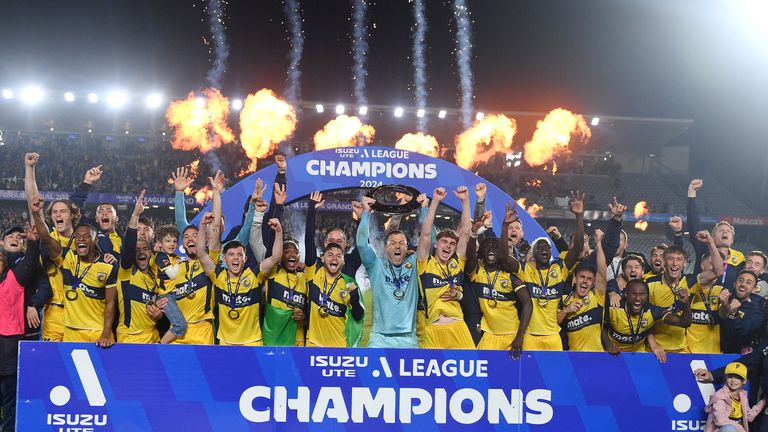[ad_1]
“Most people thought I was just his translator,” Andres Clavijo tells Sky Sports. “It was hard to get away from the stigma of that, almost.” This desire to reinvent himself as a coach has taken him to Perth in Australia, the most remote city on earth.
You will remember Clavijo, even if you cannot recall the name. He was Marcelo Bielsa’s right-hand man, his voice for two seasons in the Premier League. For Leeds United supporters, he was the messenger, eagerly devouring every detail that he could pass on.
Occasionally, Bielsa, the celebrated Argentinian coach with a cult following, would urge the man tasked with communicating his words to speak up or be more demonstrative. It was tricky at first because Clavijo was no professional translator but the head analyst.
His background did help. “My parents moved to London from Colombia when I was five and never learned English so my childhood was spent translating for them everywhere I went. In a way, it did feel like I had been preparing for it all my life.
“At first, it was difficult with all the cameras in your face. Marcelo just told me that I was now an actor. I had to mimic his expressions. I really grew into it but it was difficult given how long some of his monologues would go on. I think I did pretty well considering.”
How Clavijo met Bielsa
The story of how Clavijo found himself sat in front of the media delivering press conferences in the world’s most popular league began at Football Radar, then a small data company, where his job was to collect and analyse information on French football.
Bielsa’s desire to devour such detail ahead of taking the Marseille job led to a meeting. Clavijo was young – he is only 34 now – but impressed with the quality of his work. It would lead to a five-year working relationship. But there were hoops to jump through.
“I did the report for him but after that I did not hear from him and thought that was that. Then, before he took charge of Lille, he got in contact with a colleague and said, ‘Look, I want to meet that guy who did the report for me. I will be in London. Can I meet him?’
“We spent the whole day together with him quizzing me on French football. At the end of it, I took a chance and asked him what I had to do to work with him. Fortunately, I had impressed him enough to start doing so from afar. It was almost like an internship.
“The way Marcelo works is that in order to join his staff, you have to go through this process. Everybody on his staff goes through it. You are assigned tasks and if your work is good enough, you move up the ladder. It was three years before I got a full-time job.”
He finally joined Leeds once they were promoted to the Premier League and the depth of his devotion to the role is illustrated by his schedule. Clavijo was an analyst and a translator, but he was so much more than that. “He wanted me around all the time.”
Clavijo reveals: “I was picking him up from his house most days and dropping him off. If he had anywhere to go, I would be the one to take him to his medical appointments or going sightseeing. During my time at Leeds, I don’t think I had many days off.”
As Bielsa’s translator, he needed to be on call constantly. “I was translating in group meetings, individual meetings, pre-match, half-time, press conferences. In almost every situation. It was a lot of hard work and very stressful at the time,” he explains.
“When you come out the other end, you realise how much you have grown and what a privilege it all was. It set me up really well for the future. Even when I was working there, everyone would say, wherever you go next will feel like a breeze. It was exactly like that.”
Secrets of Bielsa’s success
So, what is it that makes Bielsa so good? “He is the most meticulous coach. There is literally nothing he leaves to chance. Nobody studies the opposition more than he does. We had to analyse every single game. If it was round 35, that was all 34 games.”
It was because of his tactical approach. “We knew what every team would do, every change of shape. For Marcelo, given the way he liked to press man-to-man, that was very important because the position of our players would then have to change also.
“I thought I knew about football before I went to Leeds. When I got there, I realised I did not really know anything. His sessions were like nothing I had ever seen before. It was a sight to behold. Nobody coaches like him. I think only Marcelo can do it. It is unique.”
Is it not all a bit much? “It is a lot of repetition, mostly unopposed, and that is not easy for players.” Bielsa is currently in charge of Uruguay and Luis Suarez recently opened up about players being unhappy, suggesting he does not even say hello in the morning.
“He does not get close to his players because he does not want to develop an attachment to them. He does not want outside influences affecting his judgment. But he always said hello to everyone and he is very charismatic so I find it hard to believe.”
Clavijo remains an admirer, regarding the experience as an education that prepared him perfectly once he wanted to embark on the coaching career that had always been his plan. There was a spell in Gibraltar with Magpies FC. It was a far cry from Bielsa’s Leeds.
“The resources were the complete opposite of Leeds but we had a very successful time, won the first trophy in the club’s history and qualified for Europe. It was great.” Stealing some of Bielsa’s methods was a logistical non-starter even if Clavijo had wanted to.
“For one, you need a very big staff. In one training session, another coach might have three or four exercises. With Marcelo, it is 10 or 11 and there are people running around the pitch, picking up cones, putting down poles, just constantly during the session.
“Then there was the video work. Every player would have their own individual video analysis session with clips from previous games all prepared for them by the analysts. To copy all that, you need a lot of people to carry it out. It is almost impossible.”
Success in Australia
After Gibraltar came the opportunity in Australia, linking up with Leeds-born Nick Montgomery at Central Coast Mariners, but the move to the other side of the world came with a twist when Montgomery took the Hibs job within weeks of Clavijo arriving.
“It was a very steep learning curve. I wanted to take my first steps here, be eased in as part of the supporting cast. Suddenly, I was the most senior person on the coaching team. But after working with Marcelo, it was, not easy, but easier. I enjoyed it.”
It helped Clavijo that Mark Jackson replaced Montgomery. Both Jackson and his assistant Danny Schofield had worked with Bielsa as part of the staff at Leeds too. “I think that is why we blended so well and it helped us to win the treble last year.”
Having moved to Perth Glory this summer, Clavijo continues to progress his career and feels the step from second assistant to assistant is the next on the ladder. In Europe, he hopes. “But the ultimate goal is to be the head coach one day myself,” he says.
“Coaching has always been my dream and I have done everything to take steps in that direction. I did a sports science degree, started gathering my coaching badges. While I was at university, I was the U18 analyst at QPR. I want to get to the best level I can.”
Maybe one day he will be back in the spotlight, choosing his own words this time. If he does so, he is in doubt that it is the influence of one man in particular that will have helped him get there, infusing him with a work ethic that still drives him on today.
“it is something that is never going to leave me. It is ingrained in me now. I understand the demands. You will not find many people who put in more hours than I do. It has almost become who I am. And it has made me a better person in and out of football.”
[ad_2]
Source link



